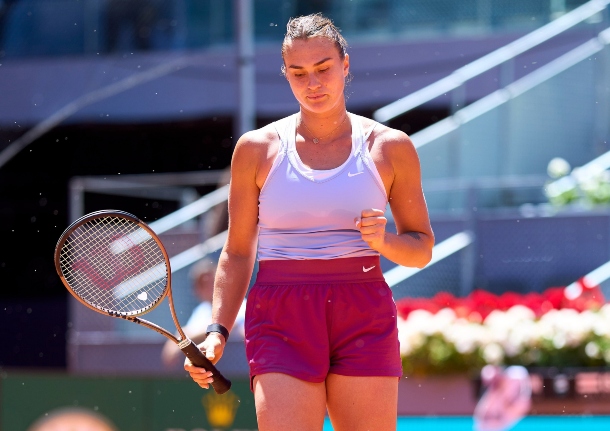
By Erik Gudris | @atntennis | Monday, May 22, 2023
It’s not been the best couple of weeks for the WTA.
While the WTA 1000 events in Madrid and Rome concluded with Aryna Sabalenka (Madrid) and Elena Rybakina (Rome) winning their respective singles titles, several issues created less than ideal public relations for both tournament organizers and the WTA.
These issues continue to generate discussion on social media and in the sports press about how the women's tour is treated differently than the men's tour.
First, in Madrid, there was “cakegate” when Sabalenka was presented with a smaller birthday cake the day after hometown hero Carlos Alcaraz was given a much larger cake for his on-court birthday celebration by organizers.
At the end of Madrid, the women’s doubles finalists and champions were, for no explicable reason, not permitted the opportunity to speak and say Thank Yous during the trophy presentation.
Finally, just this past weekend, Rome endured its own issues when the women’s singles final was scheduled at 11 pm on Saturday night, rather than be moved to the next day, due to multiple rain delays.
That created less than ideal playing conditions, along with a dearth of fans in the stadium, who ended up booing during the trophy ceremony perplexing both the champion Rybakina and the finalist Anhelina Kalinina.
The ceremony got even more awkward after Rybakina was prompted to speak before finalist Kalinina and then had to prompt the on-court officials to hand her her trophy.
Madrid tournament organizers later apologized for the snafus at their event. Regarding the Rome singles final, the WTA issued a statement defending the scheduling decision citing ongoing inclement weather as the main cause.
“It’s not the desire of the event nor the WTA to see a match go on as it did, but it was the right thing to do, a WTA spokesperson told Reuters in a statement.
After the last two weeks, players, commentators, tennis journalists, and fans took to social media to first complain and then try to understand why situations like these seem to occur more frequently at WTA events rather than ATP events.
On Madrid, it’s no secret that organizers have long favored the men’s over women’s matches throughout the history of the combined Masters event.
The biggest reason is likely cultural, considering the event is held in Spain. Even if tournament organizers don’t think they have bias for the men over the women, issues like “cakegate” and the doubles ceremony, revealed that those cultural biases are still very much in effect, even if unintentional. As they say, actions speak louder than words.
As far as Rome goes, while weather played the main factor in the scheduling problems, it’s fairly common at combined events, no matter the country they are held in, that if scheduling issues arise for whatever reason, women’s matches, not all the time, but often, lose out to men’s matches in terms of getting pushed back, delayed, or scheduled at less popular times or on smaller show courts.
When it comes to the subject of equal prize money, to be fair, Madrid does give equal prize money to both men's and women's fields. Rome, at the moment, still does not. That's not a cultural bias so much as a lack of initiative, frankly, on Rome organizers' part to rectify the issue.
So why is all this happening?
The biggest reason is the continuing perception, including among many fans, that men’s matches are more compelling than women’s matches. And, some, though not all, tournament organizers, and even broadcasting and streaming channel programmers, also still very likely have that inherent bias, whether they admit to it or not.
So what can be done?
In response to Shriver’s tweet, Diane Elayne Dees, noted tennis writer and founder of the Women Who Serve website, offered up perhaps the best response and possible solution.
For those who compete on the WTA tour, taking a stand, which could include boycotting events, or even the WTA itself, to finally address these long-standing issues may be the final solution.
Yet it would take a united front, which could be challenging for lower-ranked players to agree to, considering they are the ones that benefit the most from the big prize money and ranking points on offer at the tour’s biggest events, especially if the tour’s biggest stars are not entered at that particular time.
Will the Madrid and Rome fiascos spark a call for real change for the WTA and its tournaments worldwide?
Or will it just conclude with another lively discussion that, unfortunately, ends as only that, a discussion.
Only time will tell.
Photo credit: Mutua Madrid Open Facebook